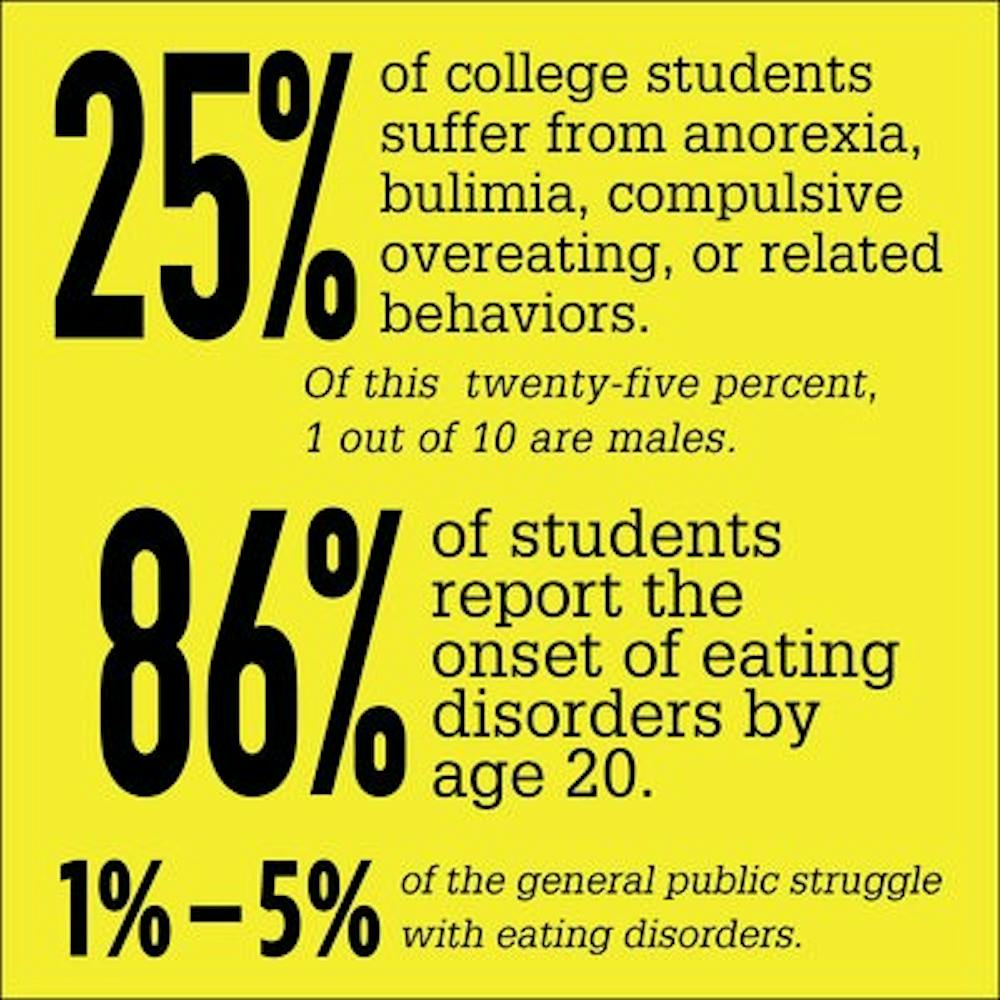If you have ever said "Do I look fat in this" or "I feel fat today," listen up. The Auburn University Body Image Education and Eating Disorder Awareness (Aubie EDA) organization is raising awareness of the use of "fat talk" by hosting Fat Talk Free Week on October 20-24.
Fat Talk Free Week is an international campaign whose purpose is to bring awareness to body image issues and eating disorders. The event focuses on damaging affect of an ideal woman (or man) that the media displays.
Each day of the week will challenge Auburn students -- men and women -- to end the use of fat talk and make a positive impact on campus. With themed days including Friends Don't Let Friends Fat Talk, To Love the Skin You're In, Operation Beautiful, Wear the Hashtag #FTFW and Fat Talk Free Friday, Aubie EDA will have different activities and events for students to participate in on the concourse.
Meg McGuffin, senior in media studies, serves as the president of Aubie EDA.
"The purpose of the event is to educate people on what exactly 'fat talk' is," McGuffin said. "You don't even realize that you do it."
According to McGuffin, fat talk is talking about your own or someone else's body or looks in a negative manner.
"I think most people say something negative about their bodies at least once a day," McGuffin said.
She said she encourages students to not only stop using it, but to provide accountability to their peers who use fat talk.
"Honestly I have just always felt very strongly about the way the media portrays women's bodies," McGuffin said. "We should be viewed as beautiful because of our accomplishments and the ways we serve others, not the way we look."
She said she grew up as a dancer and was always in front of mirrors where she and her friends were "constantly comparing ourselves to each other."
While McGuffin said she has never struggled with an eating disorder, she said she has watched multiple of her friends suffer.
This is the second year that Aubie EDA has hosted Auburn's Fat Talk Free Week and it is hoped that students will understand ways to better avoid using fat talk, according to McGuffin.
"It has definitely established an awareness of fat talk," McGuffin said. "People look forward to it."
She said she realizes that students who struggle with an eating disorder feel alone, but she encourages them to seek help.
"The reason they feel alone is because we don't openly discuss it," McGuffin said.
Kate, an Auburn student who preferred not to use her real name because of her disorder, said that she is guilty of using fat talk against herself.
"I think that seeing other girls who struggle with this and want to combat it," Kate said. "It's a successful movement for sure."
Kate's battle with anorexia began when she was a sophomore in high school.
"I guess I realized that I gained a lot of weight and was not a certain size," Kate said.
She said that she became obsessed with comparison and counting calories, even to the extent of researching restaurant menus hours before going to eat.
"I could probably tell you all about the calories in meals from chain restaurants," Kate said. "It definitely affected me mentally and physically."
Kate said she has overcome the disorder, but that she still struggles with body image.
"It has been a process," Kate said. "It still haunts me."
Kate said she now realizes how much the use of fat talk affects people and is hopeful that the Fat Talk Free Week will raise awareness.
"I hope it will raise understanding that whenever you say things, words affect you," Kate said. "And whenever you change the way you look at others, you change the way you look at yourself."
Being someone who is on the other side of an eating disorder, Kate said she encourages students to realize that "we are fearfully and wonderfully made." She said she understands that not everyone shares her beliefs, but she knows that everyone wants to believe they have a purpose.
"You harming your body does nothing to reach that potential," Kate said. "Surround yourself with life-giving people who will support you and hold you accountable for how you treat your body."
Kate said she thinks Fat Talk Free Week is a "great tool and it makes me proud of my school that we can come together and support this."
Dr. Annette Kluck, associate professor in counseling psychology, trains psychology students and researches the risk factors of eating disorders.
"They have really devastating effects," Kluck said. "It causes students to miss out on the college experience."
According to Kluck, she has never personally struggled with an eating disorder, but she is well aware of the effects of fat talk.
"I think it's important that we raise awareness about the effects of fat talk," Kluck said. "Fat talk makes weight and size seem like the most important things."
Kluck said that it is not uncommon for people to hear fat talk and then begin using against themselves, but that she is hopeful that the event will shed light on this.
"These events are designed to be a first step," Kluck said.
For more information on Fat Talk Free Week, visit here.
Do you like this story? The Plainsman doesn't accept money from tuition or student fees, and we don't charge a subscription fee. But you can donate to support The Plainsman.




